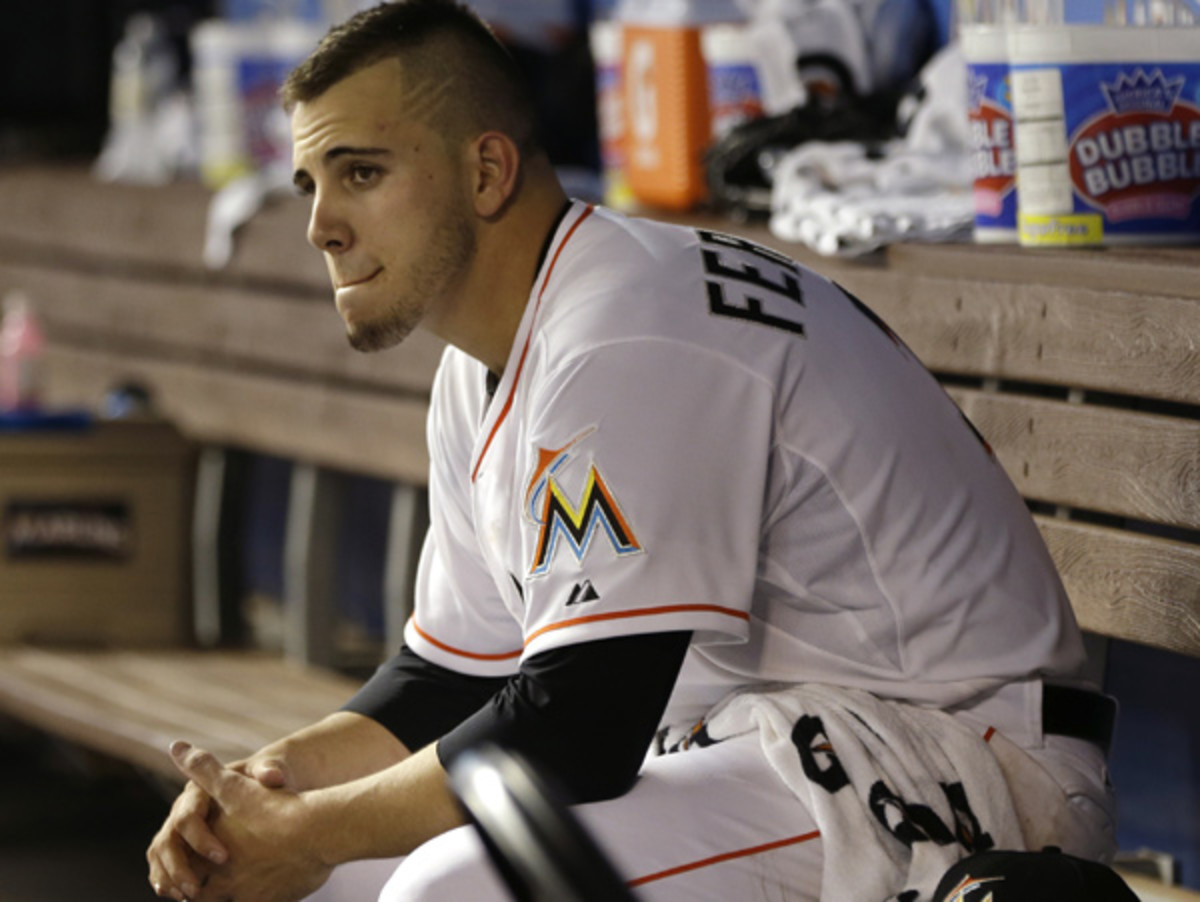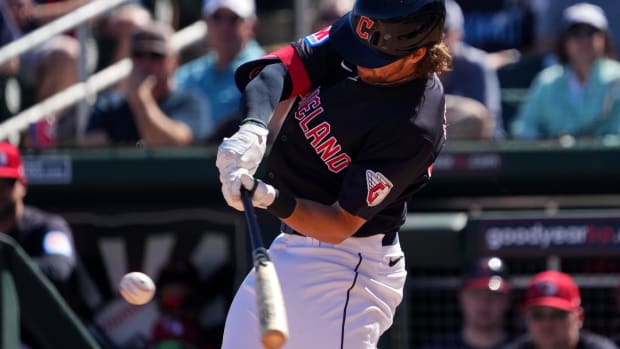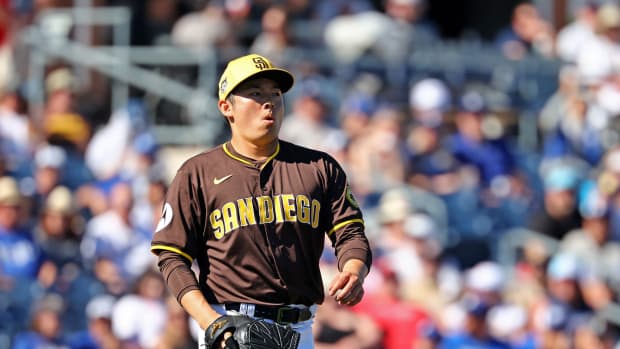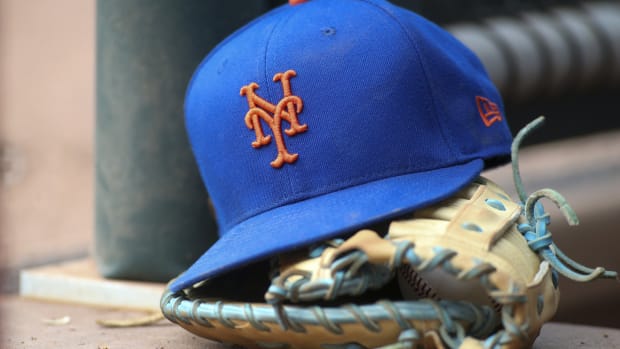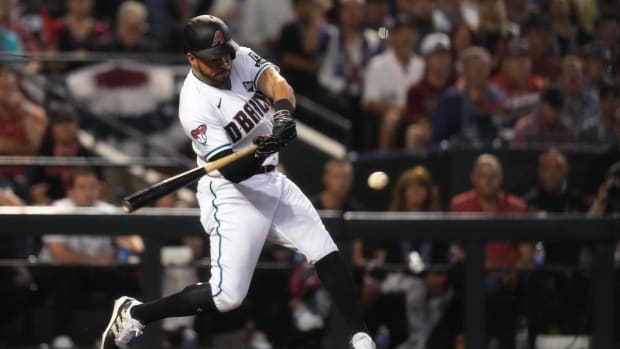Jose Fernandez's Tommy John tale takes an unsettling turn
Jose Fernandez will miss the rest of the 2014 season and part of 2015 after undergoing Tommy John surgery. (AP)
You have reached your limit of 4 premium articles
Register your email to get 1 more
The loss of Jose Fernandez to Tommy John surgery blindsided the baseball world, robbing the game of a brilliant young star, at least temporarily. But just as the 21-year-old ace threatened to recede into the bleak landscape of this year's wave of injuries, things have taken a turn for the weird. First came a rare statement from a lawyer on his surgery outlining the timeline of Fernandez's demise. Then, in his first round of media availability since the surgery, Fernandez himself contradicted that statement, shining a light into the current epidemic's darker corners while showing unusual loyalty to a team that has rarely merited it.
To appreciate how strange things have gotten, it's worth reviewing the events of the past two weeks. Fernandez left his May 9 start against the Padres after his velocity had taken an alarming dip over his final inning-plus of work. Initially, the Marlins believed that the falloff was attributable to an upset stomach, but an MRI taken in Los Angeles on May 12 under the care of Dodgers team physician Dr. Neal ElAttrache revealed Fernandez's ulnar collateral ligament sprain. The following day, he received a second opinion from team physician Lee Kaplan that confirmed everyone's worst fears: His UCL was damaged enough to require the season-ending surgery. He went under the knife that Friday.
Up to that point, the story is all too routine, but later that day, his attorney, Ralph Fernandez (no relation), took the unusual step of releasing a statement that traced the pitcher's problem to his May 4 start against the Dodgers:
"Jose did not have a pre-existing condition. While pitching during the recent Dodgers game in Miami, he was struck by a ball on his rear thigh. This prompted a completely unanticipated change in delivery which neither the staff nor his coaches could discern.
"After the game, we spoke as we always do. Jose was concerned about his arm. Despite many exchanges on the subject in the days that followed, he felt that with the Marlins regaining first place in the division, he could not let his team down. Apparently the injury was worse than he believed. In San Diego in the third inning, he suffered a traumatic event, tossed a couple of more innings and the rest is history."
Even given that Fernandez is a client of Scott Boras, the game's most powerful agent, this is odd. In the cases of similarly high-profile clients Stephen Strasburg and Matt Harvey, Boras has gone along with the program prior to Tommy John surgery and sounded notes of caution in the aftermath; taking the long view of the two pitchers' careers, he was on board with Strasburg's late 2012 shutdown and has cautioned Harvey against returning too soon. In neither case — or in any other other Tommy John surgeries that come to mind — did things descend into legalese, as they have in Fernandez's case.
The attorney's statement more or less exonerated the team while raising the question of why the pitcher didn't speak up about his discomfort instead of pushing himself to take his next turn; had they known, the Marlins would have certainly prevented their ace from doing so. As it was, manager Mike Redmond confirmed that he didn't notice any difference in Fernandez's delivery after getting hit by the grounder against Los Angeles, telling reporters, "I don't think it affected his delivery… He looked the same to me in that game after that."
Elsewhere in the statement, Ralph Fernandez addressed the pitcher's having received advice against the surgery from his personal pitching coach, Orlando Chinea, a former pitching coach in Cuba and Japan who had worked with him since he was 15 years old. Via the Sun-Sentinel's Juan C. Rodriguez:
Reached earlier this week, Chinea expressed his opinion that Tommy John was unnecessary. He also was critical of Fernandez for participating in just 17 days of workouts during the offseason, opting instead for rigorous cycling that in Chinea's estimation did not to prepare Jose's arm.
"I know him perfectly," Chinea said. "I know his weaknesses. I know the tension he generates in his arm when he pitches. If he has the surgery, I hold the Miami Marlins responsible. That would be like sitting the kid in the electric chair. The kid is 21 years old."
Chinea added that even with the severity of Fernandez's tear, he could rehabilitate him in six to eight weeks and eliminate the need for surgery.
Via the statement, Boras and Marlins owner Jeffrey Loria both agreed with the doctors that surgery was the proper course of action. That assertion was backed up by the pitcher's comments during a pregame interview on Tuesday afternoon in which Fernandez told reporters that his UCL "came off my bone completely," leaving no choice but surgery. While admitting to having felt discomfort ("a little pinch" in his elbow during the Dodgers game), he discounted the claim from the statement — from his own representative — that he had altered his delivery. He felt fine after his next bullpen session but went into the San Diego start "knowing I wasn't 100 percent," but doing so "because we were in first place." More:
“I know health and all that stuff comes first for some people. For me, my team comes first. That’s who I am. I wish I could change it. Hopefully I’m going to learn from it. [But] I’m still happy with the way I made the decision.”
...“I don’t regret not saying anything. I think that was my call… It probably wasn’t the smartest thing. But this is my team and I give my life to my team. That was the right call.”
Fernandez told Fox Sports Florida's Craig Minervi more or less the same things in a television interview:
[mlbvideo id="33009053" width="600" height="336" /]
Wow. However laudable Fernandez's loyalty to his teammates may be in the abstract, it was extremely short-sighted. Had he spoken up about his initial discomfort, he may have been able to avoid surgery, merely spending a month or so on the disabled list with a lesser UCL sprain. By taking the mound in the condition he did, not only did he lower the team's chances of winning that night (they lost to the Padres, 10-1), but in all likelihood he exacerbated the weak ligament to the point of completely snapping.
Maybe it's just the folly of youth, but Fernandez's talents deserved better. He brazenly went down the road from injury to surgery while having relatively little financial protection; he's making just $635,000 this year, and won't be eligible for arbitration until after the 2015 season. For as brilliant as his performance has been to date, he has no security if things go wrong, which is no small concern given the rapidity with which pitchers such as Brandon Beachy, Daniel Hudson, Cory Luebke, Kris Medlen and Jarrod Parker have required second surgeries.
In the wake of that pinch in his elbow, Fernandez is likely to feel an even bigger pinch in his pocketbook. Note that Harvey, who entered this season with 72 days more service time than Fernandez, is making just $546,625 this year while rehabbing. Strasburg, in his first year of arbitration eligibility, saw his salary more or less stagnate from $3.9 million last year (as mandated by the four-year, $15.1 million deal he signed upon being drafted in 2009) to $3.975 million this year — that in an industry awash in cash. As FanGraphs' Wendy Thurm pointed out, once Fernandez becomes eligible, he and Boras could point to the first-year arbitration salaries of pitchers such as Max Scherzer ($3.75 million in 2012) and David Price ($4.35 million in 2012), but that system is based on comparable players, and those pitchers had no track records of injury at the time of those contracts.
Indeed, there's an impending clash between Loria and Boras given the way the two tend to operate. The Marlins have the game's lowest payroll ($43.6 million, via Cot's Contracts); they were second-to-last in 2013, during the aftermath of the team's big fire sale. In addition to shedding the high-profile free agents it signed prior to the 2012 season, Miami has thus far avoided participating in the industry-wide wave of buying out the pre-free agency years of its young players in order to guarantee cost certainty; if the team can't lock up Giancarlo Stanton, it is not likely to be able to do so for Fernandez. That goes double given Boras' tendency to take his big-name clients year-to-year in an effort to maximize their earning potential.
Particularly given his words in the immediate aftermath of a season-ending trauma, it's tempting to chalk Fernandez's course of action up to the mistakes of a young man. Who among us were at our mental peaks at age 21, or in the face of such a life-changing event?
Still, Fernandez's extreme talent merited better counseling, starting with more education as to the potential consequences of pitching through pain and injury. For all of the efforts to determine the root causes of this ongoing Tommy John surgery epidemic — year-round pitching at a young age without enough rest, no coordination across youth programs with regards to pitch counts and innings caps, an effort to light up radar guns beyond what those young arms can withstand and a win-at-all-costs approach at the amateur levels, to name just a few factors that can damage a pitcher before he reaches the professional ranks — players need to be educated as to the risks they face. Often, they need to be protected from their own competitive drive, from trying to live up to the code of machismo that leads damaged players back out to the field where they can exacerbate their injuries to a career-threatening extent.






























